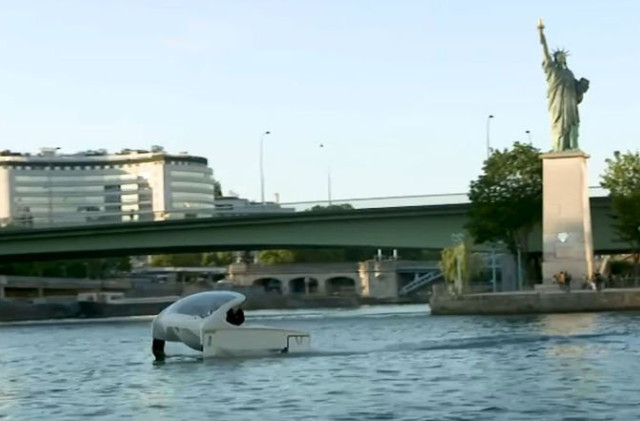On Wednesday the first prototype of a SeaBubble was tested on the River Seine before it was to be presented on Thursday at the tech fair VivaTech at the Porte de Versailles.
The idea is that the SeaBubbles can one day be used as taxis along the river which cuts through the heart of Paris and help reduce traffic congestion in the city. They would be ordered by members of the public through a mobile phone app, in the way that Uber taxis are.
“We have requests from all over the world,” said French creator Alain Thébault, a former yachtsman.
“The problem is the same in all cities. In Paris, we cannot continue to have all these cars on the quays, we must take back the river. There is room for the cruise boats and also for the SeaBubbles,” Thébault said.
The “SeaBubble” – “a bubble with four wings” – floats above the water, and can reach 18km/hr thanks to two small electric motors.
It floats 70 centimetres above the river, only making contact with the water via its four “marine wings”, or foils, which reduces the resistance by 30 to 40 percent compared to a boat of a similar size.
Like cars the boats can fit five people, essentially four passengers and a pilot.
“The idea actually came from my daughters after I sailed from LA to Hawaii recently,” the inventor, Alain Thébault, a former French Yachtsman told The Local previously.
“They told me to invent a zero-emission cab because they were sick of seeing the pollution in Paris, London, and in the US.”
After this week's first tests, demonstrations with the public will take place in September. A dock where the electric powered boats can be recharged will be installed on the river bank next to the Musée d’Orsay.
Paris Mayor Anne Hidalgo has up until now supported the project but it remains to be seen whether she will sanction it. However with so many cities apparently interested Hidalgo will want to be first, if the tests go as planned.
 (Previous image of what the River Seine could look like in the future. AFP)
(Previous image of what the River Seine could look like in the future. AFP)



 Please whitelist us to continue reading.
Please whitelist us to continue reading.